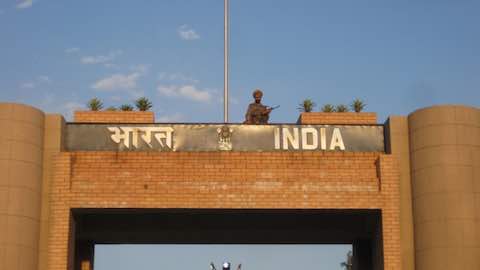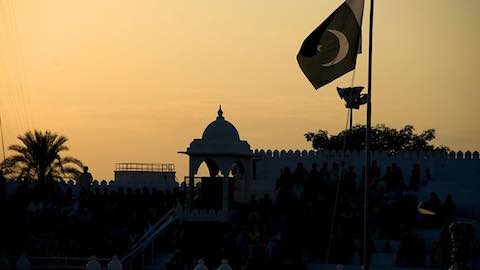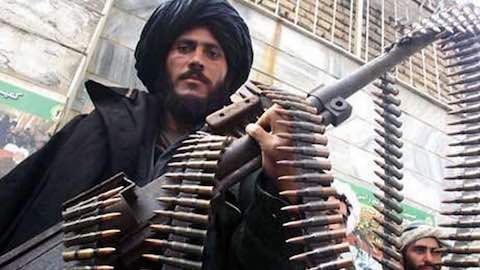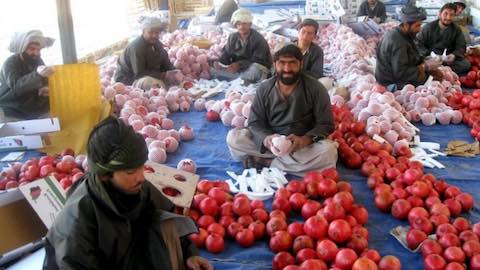- MENU
- HOME
- SEARCH
- WORLD
- MAIN
- AFRICA
- ASIA
- BALKANS
- EUROPE
- LATIN AMERICA
- MIDDLE EAST
- United Kingdom
- United States
- Argentina
- Australia
- Austria
- Benelux
- Brazil
- Canada
- China
- France
- Germany
- Greece
- Hungary
- India
- Indonesia
- Ireland
- Israel
- Italy
- Japan
- Korea
- Mexico
- New Zealand
- Pakistan
- Philippines
- Poland
- Russia
- South Africa
- Spain
- Taiwan
- Turkey
- USA
- BUSINESS
- WEALTH
- STOCKS
- TECH
- HEALTH
- LIFESTYLE
- ENTERTAINMENT
- SPORTS
- RSS
- iHaveNet.com: Central Asia Current Events
-
The increasing politicization of Afghan universities should be high on the list of security concerns. Anti-Western and anti-government militant groups are winning the increasing support of Afghan university students
-
After years of war, $664 billion spent and 2,210 Americans dead what has the United States built in Afghanistan? According to a top international law enforcement official, the United States is building 'the world's first true narco-state'
-
Until 1998 the Left Bank of the Ishim had almost nothing to show. Now it is the site of Astana, the showcase capital of Kazakhstan. In stark contrast to eastern Europe, where historical debates overshadow contemporary affairs, Astana's focus on the future is refreshing
-
Kazakhstan's arts scene has acquired an innovative new theater that aims to promote experimental drama and also prove that theater can be a profitable business
-
Balochistan has struggled for independence from Pakistan for decades. Vikas Kumar believes upcoming elections and the US withdrawal from Afghanistan will provide Baloch nationalists with opportunities to rejuvenate their cause
-
While Georgia's politicians believe that reforming the country's armed forces is essential, they remain divided over what roles civilians should play in national defense. Eugene Kogan outlines the issues surrounding Tbilisi's military reforms and what Russia thinks about them
-
History may judge Hamid Karzai more kindly, whether Afghans who depict him as a stooge of foreign infidels, or foreigners who accuse him of being an unreliable partner. Unlike Shah Shuja, his agility and performance may be more appreciated once he relinquishes power
-
Now it can be told: United States government auditors are finally acknowledging that Afghan security forces will be incapable of defending the nation from the Taliban after Western forces withdraw in 2014. What does this mean?
-
While Afghanistan may remain a troubled land as the US-led intervention force prepares for military withdrawal in 2014, the rise of its media industry has been a success story acknowledged at home and abroad
-
NATO's announcement that it will pull out its 130,000 troops from Afghanistan by the end of 2014 and hand over control to Afghan security forces has been open to criticism
-
Kabul in the winter of 1989 was a city in monochrome, where grim public buildings seemed to have taken on the hue of the mud-plastered homes that stretched across a wide plain
-
Central Asia has increasingly dazzled players from near and far, once they've grasped its worth as a crucial source of energy and as a strategic asset. Among these we may count India
-
Although Kabul appears to have made some progress towards reducing graft, the total cost of corruption increased in 2012 totaled almost a quarter of the entire amount of aid from the international community
-
Pakistan is an utterly failed state that is tumbling down the abyss. Where else could a fundamentalist cleric who lives in Canada draw tens of thousands to a rally calling for dissolution of the government?
-
Stronger civil registration systems are needed in Asia, home to 60 percent of the world's population, to ensure the legal and human rights of all, and facilitate health planning
-
While Afghanistan may remain a troubled land as the US-led intervention force prepares for military withdrawal in 2014, the rise of its media industry has been a success story acknowledged at home and abroad
-
Just when you think the militant Islamic Taliban movement can't sink any lower, you hear another story as deplorable and cowardly as the shooting of Malala Yousufzai
-
Militant Islamism is not primarily responsible for instability in the region despite claims to the contrary
-
The general assumption is that Afghanistan is a notorious exporter of violence and that the pullout of troops in 2014 from the country portends trouble for neighboring states. Yet this assumption rests on shaky evidence
-
Forget about the badminton scandal. Perhaps the most egregious behavior so far at these Olympic Games has been the boxing officiating
-
Two of the most restive regions continue to influence the strategic calculations of India and Pakistan. And while the projection of soft power by both countries may prove to be a confidence-building measure, its long-term impact upon regional security dynamics remains far from clear
-
As the United States prepares to exit Afghanistan, it is overlooking the political elements of the transition. To leave behind a stable government in 2014, Washington needs to push harder for electoral reforms, negotiations with the Taliban, and a regional settlement involving Pakistan
-
Although it was no secret that China had been gobbling up strategically important resources in emerging markets, people wondered how a country that had not contributed to Afghanistan's transformation could now reap its mineral benefits
-
Even before forces begin leaving Afghanistan, predator nations are pouring lavish praise and buckets full of cash on Afghan leaders, trying to win access to the nation's vast natural resources
-
While Russia remains centrally important to most of the post-Soviet space, Moscow's direct influence across this region is far from assured
-
Russia's energy supplies ensure that Moscow maintains a geopolitical foothold in the European part of the former Soviet space
-
American support for the Afghan war has collapsed. Several new surveys show that even most Republicans, from the party that is home to the nation's hawks, now oppose the 10-year-old conflict. And it's no wonder
-
Militarization is no substitute for development when it comes to combating radicalism in the Afganistan and Pakistan
-
The killer walked from his base to one village, then another, leaving behind the lunacy and spiritual wreckage of American foreign policy. Then he walked back to his base and calmly turned himself in
-
An American soldier's killing of 16 Afghan civilians, including nine children, represents only a moment in this long war, but it is an important moment
-
The United States can remain in Afghanistan indefinitely but it cannot defeat the Taliban, and it has many important issues to attend to elsewhere
-
A less-known quandary to the mix is that most Afghan soldiers are regular drug users -- even addicts. Why not, if soldiers are products of their national culture?
-
A former guerrilla commander now a leader of Bangladesh' indigenous people has charged the Bangladesh authority with 'betrayal' of their political autonomy of the ethnic minorities living in the hill forests in the country's southeast region
-
Reporting out of Afghanistan is decidedly downbeat these days, intimating that the United States is entangled in an unwinnable war. The focus tends to be on what is not working in the country. This is perhaps understandable given that foreign often cover death and destruction in Afghanistan. But they aren't seeing what is working
-
In comments that could rile Congress, Pakistan's ambassador to the United States said that his country doesn't seek U.S. aid, but ending it would hurt U.S. relations with the Pakistani people
-
Another round of flooding in Pakistan offers the United States an opportunity to build goodwill in a strained relationship
-
Mutual distrust between the United States and Pakistan in part results from mistakes and misjudgments by both countries that date back to the 1979-89 Russian occupation of Afghanistan. But at its heart is an American strategy that not only runs counter to Pakistan's interests
-
Temperatures in the southern Pakistani province of Sindh's Badin District, the area worst affected by floods which began in August, are still warm, though tens of thousands of people without adequate shelter are beginning to feel chilly at night
-
Population of the world's poorest nation, Bangladesh, has been counted by a United Nations agency at 150.5 million as the world's population is expected to reach 7 billion
-
When it comes to dealing with the United States and NATO on security issues in Central Asia, Russia is acting tough while operating from a position of increasing weakness
-
Central Asia and the Middle East has been the main arena for the U.S. intervention that followed the 9/11 attacks. Obviously, the United States had been engaged in this area in previous years, but 9/11 redefined it as the prime region in which it confronted jihadists. That struggle has had many phases, and it appears to have entered a new one over the past few weeks
-
In a year of promises, unmatched violence, and pointed fingers, public attention has been diverted away from the Taliban and onto a new source of violent opposition. The Haqqani network is now the target of American ire in Afghanistan
-
In the wake of its strategic partnership agreement with India, Afghanistan has become an untouchable, even an 'enemy', for many Pakistani commentators
-
Russian Prime Minister Vladimir Putin has outlined a grand vision for integrating ex-Soviet states in his first major policy initiative since he announced his intention to return to the Kremlin
-
A recent report by opposition website Gundogar.org provides plenty of these, alleging preferential treatment by authorities to prop up the business interests of the president's family
-
So the Taliban is going to get out of the heroin business because someone convinces them that planting corn or some other crop is a better alternative?
-
The United States can't abandon Afghanistan, but American troops must leave
-
Russian officials think the Collective Security Treaty Organization, a bloc of friendly ex-Soviet republics, can develop into a security grouping on par with NATO. But recent CSTO military exercises show that Moscow lacks a clear vision for how to utilize the alliance
-
Tension between Iran and Azerbaijan is on the rise, and policymakers in Baku need to be nimble as they manage the diplomatic challenge posed by Tehran
-
On September 12, 2001, few would have anticipated the course the resulting war would take. In retrospect, many speak with great wisdom about what should have been thought about 9/11 at the time and what should have been done in its aftermath. I am always interested in looking at what people actually said and did at the time
-
Just a day after a powerful blast ripped the entrance of New Delhi's High Court, Kashmir police took three men into custody on the basis of an email believed to have been sent by terrorist group Harkat-ul-Jihad al-Islami
-
To comprehend the United States' progress in Afghanistan, it is important to understand how and where we have focused our resources and what work lies ahead. To be sure, the United States and its coalition partners still have plenty of challenges left to tackle in Afghanistan. However, there are indisputable gains everywhere we have focused our efforts
-
New York Times columnist David Brooks not too long ago criticized the way the international aid system functions in Afghanistan. He argues that 'the influx of aid has, in many cases, created dependency, fed corruption, contributed to insecurity and undermined the host government's capacity to oversee sustainable programs'
-
Though Pakistan and Afghanistan still continue to be embroiled in religious and ethnic conflict, the rest of South Asia appears keen to check and go beyond such tendencies
-
When viewed in the context of other recent attacks in Kabul and other parts of Afghanistan, the Taliban's attack on the Intercontinental Hotel was not all that spectacular. It certainly did not kill the 90 people the Taliban claim, although it does have a number of interesting security implications
-
President Obama's announcement that he'll be ordering only a limited drawdown of the more than 100,000 U.S. troops in Afghanistan by the end of the year is yet another reminder that it's much easier to start a war than to finish one. Indeed, Afghanistan offers a case study in the axiom
-
The beginning of the drawdown of U.S. and allied forces in Afghanistan will entail opportunities for the Taliban on the battlefield as forces fall back to a more limited and more secure presence
-
Policymakers in Azerbaijan are facing a dilemma: can an enemy of a friend be a friend? Specifically, can Baku maintain cordial relations with both Turkey and Israel at the same time?
-
As ties between the United States and Pakistan continue to sour, speculation is mounting that Uzbekistan may become a new ally of convenience in the US war on terror
-
The assassination of Burhanuddin Rabani will have minimal impact on Afghanistan's peace process. What it will do is weaken President Hamid Karzai's administration through the alienation of Afghanistan's influential Tajik minority
-
The strategists in the US had hoped that the Taliban would join the reconciliation process and Pakistan would behave. This is unlikely to happen. The American dream project of a free, democratic liberal Afghanistan may be tottering on its last legs
-
The head of NATO signaled his approval of President Barack Obama's speech in which he declared American troops would begin withdrawing from Afghanistan next month
-
Afghanistan is likely to face a significant food shortage in the coming months, following poor rains which have affected this season's wheat crop. Wheat is the primary food staple for most families
-
The Bangladesh government's dramatic turn around from secularism to Islamism has enraged the indigenous population, who are demanding to be recognized in a proposed re-draft of the country's constitution
-
Is 'killed by a drone strike' the new 'alive and well'? If you pay close enough attention, it makes you wonder what's really going on. Here's how this charade usually goes
-
Malala Yousafzai is an activist for women's access to education. The Taliban considers that a capital crime. It claimed responsibility for the men who stopped the bus and boarded it, shot her and fled
-
The looming question is: After 11 years, more than 2,000 U.S. military fatalities and at least $1 trillion in expenses, what are the U.S. and NATO leaving behind?
-
Unless the Central Asian states, China, India, Iran, Pakistan and Russia jointly contribute towards ensuring stability, Afghanistan is likely to fall to the Taliban again or even break up
-
We'll be leaving behind an unstable Afghanistan with hundreds of armed insurgent groups. We haven't rescued or rebuilt the country or accomplished any objective that begins to justify the human and financial cost of this adventure. We just lost
-
Do the foreign policy officials in office not understand that for American troops to stay in Afghanistan to 'provide security' is to assure insecurity, since the presence of infidel soldiers inspires hostility and resistance?
-
Thousands of flag-waving protesters marched into Pakistan's capital to demand changes to the country's political system just months before scheduled elections
-
At least 33,000 American troops are scheduled to leave Afghanistan this year. And talk is rife about accelerating the withdrawal. That leaves Afghan women scared to death
-
A sustained attack by militants temporarily shut down the capital, Kabul, and raised alarm among aid workers that the Taliban are now able to penetrate even the most secure parts of the city
-
The volume of narcotics flowing out of Afghanistan appears to have decreased slightly over the past year. But the stockpile of opiates that traffickers already have on hand is sufficient to supply users in Central Asia and Russia for 15 years
-
Asia has one of the largest concentrations globally of aging persons, creating a host of potential challenges
-
Now Hamid Karzai wants to be our friend. Even after insulting the United States at every opportunity, year after year, the Afghan president now says he wants to maintain a 'strategic partnership' with Washington
-
Afghanistan poses far more challenges than Iraq. Instead of Iraq's billions of dollars in state oil revenue, impoverished Afghan gangs export opium. Iraqis are part of the larger Arab world, living in its most strategically important area. Afghans are far more isolated and less critical to the world economy
-
Women in the Swat Valley in Pakistan's Khyber Pakhtoonkh'wa province are working harder than ever to keep their households running
-
The death toll at the Bangladesh-India border continues to mount three months after the Indian government instructed its border security forces to stop shooting civilians suspected of being undocumented migrants or a threat to national security
-
One sign of the how highly Lawrence Sheets is esteemed as an analyst of Central Asia and the Caucasus was the large turnout of his fellow journalists for his presentation of his new book, 8 Pieces of Empire: A 20-Year Journey Through the Soviet Collapse
-
Hardly anyone noticed, but the Afghan government cut the budget for the state's Independent Human Rights Commission by half this year, evidencing 'the government's lack of interest and political will in the promotion of human rights'
-
The sheer volume of negative media attention would lead any attentive reader to believe that Pakistan-U.S. relations are headed toward a severe, maybe violent, rupture. Memory is short, but the U.S.-Pakistan alliance is nearly as old as Pakistan itself
-
Despite legitimate concerns about Pakistan's loyalties, it remains in the United States' national security interest to maintain our bilateral relationship with Pakistan
-
Pakistan is neither an ally nor an enemy of the United States. Both countries have a long track record of partnering on important strategic goals. But in the last two decades, U.S. and Pakistani interests have seriously diverged
-
Neither the United States nor Pakistan views the other as a reliable ally. U.S. officials have tried to sweep this uncomfortable truth under the rug for too long
-
The United States and Pakistan need to continue working to bring policies toward closer alignment and investing in efforts to build stronger ties between our people. Pakistan is 'too big to fail' and offers tremendous potential for playing a more constructive role in its region
-
Pakistan and the United States have pursued an important partnership for the past decade, based on the premise that their strategic goals in Pakistan were the same. This is at best only half true
-
In the 20 years since the Central Asian republics of the Soviet Union became independent, the influence of the Russian language has been declining in these countries
-
The two nations' economic ties are growing thanks, in part, to their shared disregard for human rights
-
Speculation is now mounting that tycoon Gagik Tsarukian may potentially challenge President Serzh Sargsyan in next year's presidential election
-
The administration's goal has not changed. It continues to be American strategic domination of Central Asia, now to be accomplished by new forms of air, electronic and economic surveillance, persuasion and political control, as well as through targeted violence
-
For Russia, the recreation of a union is a strategic geopolitical necessity
-
Tempting as it would be to pull all Western forces out of Afghanistan soon, the United States should leave some civilian and military advisers behind
-
No one yet in Washington seems fully to appreciate or acknowledge the failure, but failure it is, the culmination of a series of events that inexorably will lead to America's departure from the most foolhardy political and military adventure in the history of the nation
-
For a symbol of how America's decade-long war is going in Afghanistan, look at the fields of red poppies flowering so bountifully there
-
President Roza Otunbayeva of Kyrgyzstan became the first senior Kyrgyz official to forcefully denounce 'bride kidnapping,' an entrenched custom in her Central Asian state
-
The New Silk Road strategy is a key aspect of the U.S. plan to promote stability in Central Asia. The hope is that boosting trade among Afghanistan and its neighbors will build prosperity and promote peace. As it stands, Iran -- Afghanistan's western neighbor, and a country with which Kabul has annual trade of about $1.5 billion -- would be sidelined
-
Thousands of ethnic Bengalis living near the Bangladesh-India border have for decades found themselves citizens of one nation but bound within the sovereign territory of another. In recent months they have escalated their campaign for a land swap that will align their citizenship with cartography
-
As they strive to control the flow of information in the Internet Age, Central Asian governments are moving away from a party-hack mentality and assuming the mindset of a hacker
-
A nation of just over 3 million, where herding and agriculture have long been the dominant features of the economy, Mongolia is on the cusp of becoming a global financial supernova. Experts estimate that the country possesses as much as $1 trillion-worth of untapped precious metals and minerals
-
Implementing the necessary reforms in Pakistan's power sector requires able leadership and internal stability as well as a conducive and transparent environment for attracting investment
-
'You cannot afford to alienate Pakistan,' Foreign Minister Hina Rabbani Khar averred. And Prime Minister Yusaf Raza Gilani confidently asserted: 'You can't live with us -- or without us.' Think again. A few days later, the Obama administration opened negotiations to improve relations with Uzbekistan, Afghanistan's authoritarian neighbor to the north
-
Karachi's astonishing violence is generally ascribed to political and ethnic rivalry. While this may be true to an extent, its roots run deep into the incredibly complex structure of this city of 18 million people, where politicians, criminals, terrorists and migrants from nearby warzones compete for power and survival
-
Since the infliction of unacceptable damage may not deter Pakistan from breaking the nuclear taboo, a 'tit for tat' strategy in case of lower order nuclear use is worth considering
-
Afghanistan's war enters its second decade with the Taliban emboldened and the United States enfeebled. But the power-play between Pakistan, India and China is also now central to an assessment of what comes next
-
A little-noted energy agenda moving rapidly forward in Afghanistan could exacerbate insecurity and instability, and ensure a prolonged U.S. and foreign military presence
-
If India is able to sustain a comprehensive partnership with Afghanistan in trying circumstances, it would serve as a model for managing its relationships with other neighbors
-
The 10th anniversary of the U.S.-led war in Afghanistan milestone passed quietly. There was little observance by U.S. troops still in Afghanistan
-
The plethora of new groups is not only a change from the previous tendency among Pakistani militant groups to form large umbrella organizations like the Tehrik-e Taliban Pakistan (TTP). It also has been accompanied by a breakdown of these larger structures, making it uncertain what kind of command structure the new groups share
-
Useful advice can be found in the past. Alexander drew his sword and slashed the knot. Barack Obama has promised a withdrawal of many or most American troops from Afghanistan in the months to come
-
The villain responsible for the raft of violence against US targets in Kabul has been identified - and the finger points directly to a shadowy insurgent group and, by extension, to Pakistan's intelligence agency
-
If you were to read two new government reports on American aid to Afghanistan, you would come away first astounded and then utterly furious, just as I did. Ten years into the Afghan war, our government still heedlessly throws many billions of dollars at Afghan organizations that steal some of it and pass the rest off to militants who use it to kill American troops
-
It is apparent that the United States is exploring ways to accelerate the drawdown of its forces in the country. It is also clear that U.S. relations with Pakistan are deteriorating to a point where cooperation is breaking down. These are two intimately related issues. Any withdrawal from Afghanistan, particularly an accelerated one, will leave a power vacuum in Afghanistan
-
Efforts to free thousands of enslaved girls in Nepal and get them into school need more funding and less government bureaucracy, activists say
-
When President Obama gathered his top advisers on Afghan policy at the White House for his latest assessment, soon-to-depart Secretary of Defense Robert Gates participated via videoconference from Afghanistan. But his advice already had been given on the ground: Don't grow more impatient
-
Just as President Obama is weighing how many troops to call home from Afghanistan, in a withdrawal process he promised to begin in July, Afghan President Hamid Karzai seems to be threatening to show them the door
-
The United States - NATO presence in Afghanistan is becoming increasingly immaterial
-
Karachi is the biggest city in Pakistan. It is the country's commercial hub, financial capital, naval base, and only operational seaport. For the past several months, this city has once again been in the grip of violence
-
It is important to look at 'brand-name' jihadist groups in Pakistan like LeT, al Qaeda, the Haqqani network and Tehrik-e-Taliban Pakistan as loosely affiliated networks more than monolithic entities.
-
Despite billions of dollars in aid and government funding over the past decade, Afghanistan still has about four million school-age children out of school, officials say
-
The military intervention in Afghanistan will cost U.S. taxpayers about $113 billion total -- roughly $2 billion per week -- in the current fiscal year. As the administration prepares for its promised withdrawal of troops starting in July, the anti-spending climate in Washington could be the impetus that opponents of the Afghanistan war have been waiting for
-
Since May 2, when U.S. special ops forces killed Osama bin Laden, the media have covered the raid from virtually every angle. The United States and Pakistan have also squared off over the U.S. violation of Pakistan's sovereign territory and Pakistan's possible complicity in hiding Bin Laden. All this, however, largely ignores the years of intelligence development in the hunt for bin Laden
-
Analyst Nathan Hughes examines the U.S. withdrawal of combat forces from Afghanistan
-
The death of Osama bin Laden, and the manner in which it was carried out, will have major repercussions for Afghanistan and Pakistan. The coming weeks will reveal whether these will take the form of threats or opportunities
-
John Maynard Keynes once wrote: "when the facts change, I change my mind. What do you do, sir?" The recent death of Osama bin Laden on May 1 in Abbottabad, Pakistan, has prompted a reassessment of the facts regarding the west's fight against international terrorism and its involvement in Afghanistan and the wider region
-
America's involvement in Pakistan and Afghanistan may be the most complex foreign-policy dilemma the nation has ever faced. And with the death of Osama bin Laden, along with Pakistan's furious response, the knot is growing ever more tangled.
-
Osama bin Laden's death during an American raid on his compound in Abottabad, Pakistan, not far from Pakistan's premier military academy, has pushed U.S.-Pakistan relations to a 'new low,' says Hassan Abbas. Abbas says this is typical of the recent rocky relationship the two countries, which need each other but also undercut each other at crucial times
-
The killing of Osama bin Laden is producing an unexpected outcome. His death is proving to be a Rorschach test for the entire world. Everyone who looks at it sees something different, sometimes betraying hidden motivations
-
Osama bin Laden is dead. The Middle East is in chaos. And radical Islam is floundering. For a time after 9/11, bin Laden was riding high. But now bin Laden and most of his henchmen of a decade ago are dead or they are in hiding. What caused al-Qaeda's steady decline? There are a lot of reasons
© iHaveNet.com
HOME | WORLD | USA | BUSINESS | WEALTH | STOCKS | TECH | HEALTH | LIFESTYLE | ENTERTAINMENT | SPORTS
Current Events in Central Asia
Central Asia News & Central Asia Current Events. Current Events from Central Asia
Your Single Source to Current Events in Central Asia
Your Single Source to Current Events in Central Asia
RSS Feeds | Shopping | Email Alerts | Site Map | Privacy




